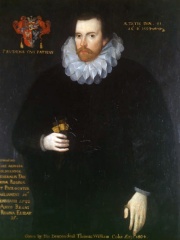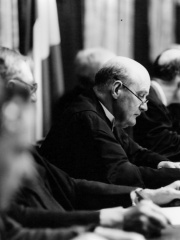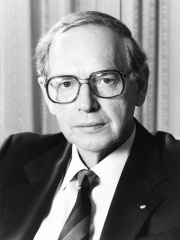


The Most Famous
JUDGES from United Kingdom
This page contains a list of the greatest British Judges. The pantheon dataset contains 53 Judges, 3 of which were born in United Kingdom. This makes United Kingdom the birth place of the 6th most number of Judges behind Italy, and Greece.
Top 3
The following people are considered by Pantheon to be the most legendary British Judges of all time. This list of famous British Judges is sorted by HPI (Historical Popularity Index), a metric that aggregates information on a biography's online popularity.

1. Edward Coke (1552 - 1634)
With an HPI of 58.90, Edward Coke is the most famous British Judge. His biography has been translated into 24 different languages on wikipedia.
Sir Edward Coke ( CUUK, formerly ; 1 February 1552 – 3 September 1634) was an English barrister, judge, and politician. He is often considered the greatest jurist of the Elizabethan and Jacobean eras. Born into an upper-class family, Coke was educated at Trinity College, Cambridge, before leaving to study at the Inner Temple, where he was called to the Bar on 20 April 1578. As a barrister, he took part in several notable cases, including Slade's Case, before earning enough political favour to be elected to Parliament, where he served first as Solicitor General and then as Speaker of the House of Commons. Following a promotion to Attorney General he led the prosecution in several notable cases, including those against Robert Devereux, Sir Walter Raleigh, and the Gunpowder Plot conspirators. As a reward for his services he was first knighted and then made Chief Justice of the Common Pleas. As Chief Justice, Coke restricted the use of the ex officio (Star Chamber) oath and, in the Case of Proclamations and Dr. Bonham's Case, declared the King to be subject to the law, and the laws of Parliament to be void if in violation of "common right and reason". These actions eventually led to his transfer to the Chief Justiceship of the King's Bench, where it was felt he could do less damage. Coke then successively restricted the definition of treason and declared a royal letter illegal, leading to his dismissal from the bench on 14 November 1616. With no chance of regaining his judicial posts, he instead returned to Parliament, where he swiftly became a leading member of the opposition. During his time as a Member of Parliament he wrote and campaigned for the Statute of Monopolies, which substantially restricted the ability of the monarch to grant patents, and authored and was instrumental in the passage of the Petition of Right, a document considered one of the three crucial constitutional documents of England, along with Magna Carta and the Bill of Rights 1689. Coke is best known in modern times for his Institutes, described by John Rutledge as "almost the foundations of our law", and his Reports, which have been called "perhaps the single most influential series of named reports". Historically, he was a highly influential judge; within England and Wales, his statements and works were used to justify the right to silence, while the Statute of Monopolies is considered to be one of the first actions in the conflict between Parliament and monarch that led to the English Civil War. In America, Coke's decision in Dr. Bonham's Case was used to justify the voiding of both the Stamp Act 1765 and writs of assistance, which led to the American War of Independence; after the establishment of the United States his decisions and writings profoundly influenced the Third and Fourth amendments to the United States Constitution while necessitating the Sixteenth.

2. Geoffrey Lawrence, 1st Baron Oaksey (1880 - 1971)
With an HPI of 55.97, Geoffrey Lawrence, 1st Baron Oaksey is the 2nd most famous British Judge. His biography has been translated into 17 different languages.
Geoffrey Lawrence, 3rd Baron Trevethin, 1st Baron Oaksey, (2 December 1880 – 28 August 1971) was the lead British judge during the Nuremberg trials after Second World War, and President of the International Military Tribunal.

3. Ninian Stephen (1923 - 2017)
With an HPI of 51.95, Ninian Stephen is the 3rd most famous British Judge. His biography has been translated into 20 different languages.
Sir Ninian Martin Stephen (15 June 1923 – 29 October 2017) was an English-born Australian judge who served as the 20th governor-general of Australia, in office from 1982 to 1989. He was previously a justice of the High Court of Australia from 1972 to 1982. Stephen was born in England to Scottish parents. As a child he lived for periods in France, Germany, Scotland, and Switzerland, eventually arriving in Australia at the age of 16. Stephen served with the Australian Army during World War II, and after the war entered the legal profession. He became one of Australia's leading constitutional lawyers. Stephen was appointed to the Supreme Court of Victoria in 1970, and then to the High Court in 1972, aged 48. He was considered a member of the court's "moderate centre". In 1982, Stephen was appointed governor-general on the recommendation of Malcolm Fraser. He approved two double dissolutions during his time in office, the only governor-general to do so. After his term expired, Stephen remained active in public life as a conservationist and member of various international tribunals.
People
Pantheon has 3 people classified as British judges born between 1552 and 1923. Of these 3, none of them are still alive today. The most famous deceased British judges include Edward Coke, Geoffrey Lawrence, 1st Baron Oaksey, and Ninian Stephen.
Deceased British Judges
Go to all RankingsEdward Coke
1552 - 1634
HPI: 58.90
Geoffrey Lawrence, 1st Baron Oaksey
1880 - 1971
HPI: 55.97
Ninian Stephen
1923 - 2017
HPI: 51.95

